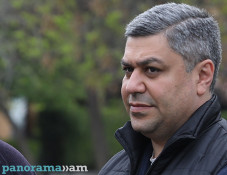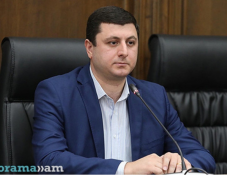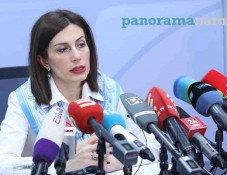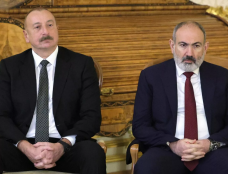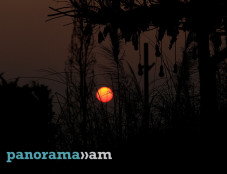
Expert of Center for Strategic Studies under Azerbaijani President threatens Iran (video)
The Vestnik Kavkaza website features an anti-Iranian video address by expert-advisor of the Center for Strategic Studies under Azerbaijani President, Heydar Mirza titled “Azerbaijan – Iran between the Past and Present.”
Touching upon the problem of wearing hijab in schools, H. Mirza said that polemics around this issue is stirred up “from without:” “Iranian propaganda mouthpiece, Sahar TV, still incredibly broadcast in Azerbaijan, is acquiring absolutely a different tone. As before, Iran uses the religious factor for the very trite scenario. This is not just spiritual and ideological influence but a scenario used every time during public discussions around religion in the country. First, lacking choice, Tehran time after time uses the same personages, representatives of the Azerbaijani society strongly influenced by the Shiite ideology: a number of villages on the Absheron Peninsula, a series of southern regions in the republic and some protest or marginalized spiritual authorities. Second, external influence is evident by the extent of support and synchronous work of the Iranian propaganda mouthpieces and local hirelings in Tehran. Speeches by mullah dictatorship speakers such as Movsum Samedov in themselves are nothing more than a blind imitation and a foul play on the thinking archetypes of Azerbaijanis.”
As to Iran’s spiritual influence on Azerbaijan, Mirza said: “Given the fact that one cannot depolitize Islam, especially Shiite Islam, you can easily trace for whom it is beneficial to lay a bomb under the secularity of Azerbaijan’s self-consciousness.”
Describing Iran’s actions as a “direct ideological sabotage and provocation,” the expert of the Center for Strategic Studies under Azerbaijani President noted that “as far back as in the early 20th century the best minds of the very young Azerbaijani nation mocked such dark sides of the Azerbaijani soul,” thus once again highlighting that the “antiquity” of the Azerbaijani nation is nothing more than a propaganda myth. The author of the report also noted that by the 19th century the majority of Azerbaijani literary works was created in the Persian language. “Drawing attention to this circumstance, M. Rasulzade stressed that Azerbaijanis, unaware of their Turkish origin, considered themselves Iranians. They were thinking like Iranians, were living Iranian mode of life, were considering themselves Iranians. Azerbaijanis forgetting their roots lost many national features,” the author said and added that “the process of Azerbaijanis’ nation building that started approximately in the mid-19th century, based on the enlightenment ideas, was characterized by a fight for the purity of the national language and marked clerical direction. In other words, in order to become an Azerbaijani, one needed to become more than just a Moslem or a Transcaucasian Turk.”
Mirza also ventured to give advice to the Iranian leadership: “Today, more than ever, given the complicated domestic situation in Iran, the minds determining Tehran’s domestic policy have to think whether it is possible to initiate building of relations with their northern neighbor by principles different from the slogans and fervent futwas by some marginalized mullahs of their suburbs in Baku, whose secular and spiritual inferiority complexes reshape into unprincipled and cheap mercenariness.”
Moreover, the expert of the Center for Strategic Studies under Azerbaijani President said that “instead of maintaining good-neighborly relations which Iran needs badly in the modern world, Tehran chooses the instrument of pressure behind the scenes,” and “existence of independent Azerbaijan may anger Tehran gryphons, may be perceived fervently.”
Further, the author of the report passes on to badly veiled threats: “After the victory of the Islamic revolution in Iran one of the first resolutions of the government was the decision of the Council of the Islamic Revolution of November 10, 1979 “On Frustration and One-sided Invalidation of Articles 5 and 6 of the Treaty between the USSR and Iran” signed in 1921. This viewpoint of the Iranian government was confirmed in the letter of the Islamic Republic of Iran Foreign Minister to the UN Secretary General of August 25, 1980. These are two articles, according to which the USSR brought troops into Iran in 1941. Russia is the successor of the USSR and today, like in 1941, there is a single state in the world that has the right to bring troops into Iran under certain circumstances. The founder of the current regime in the Islamic Republic of Iran returned from banishment by the Air-France plane, while the next one can quite get off the Azerbaijani Airlines via boarding ramp.”
Newsfeed
Videos





